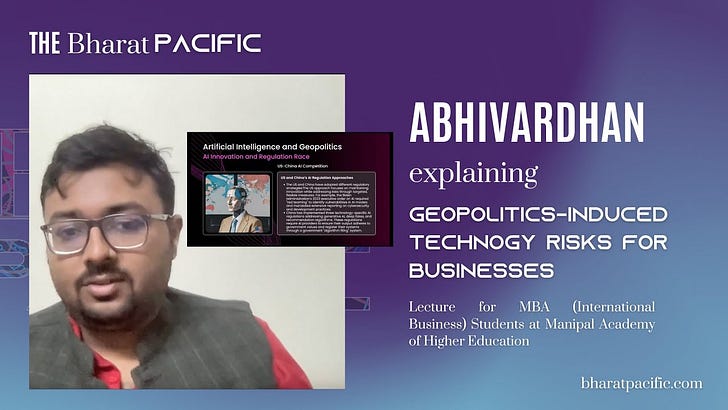Incidentally, at the kind invite of Dr Vignesh Ram, PhD, I had delivered a lecture on Geopolitics, Technology & Business Risks for MBA (International Business) Students at Manipal Academy of Higher Education.
You can check out the complete lecture at:
While it was fun interacting with the students, I came to an abrupt realisation hours after the lecture was over.
That 2025 will be the year of Artificial Intelligence Education, in India, the Indo-Pacific, and the world - cc Jason Gulya. Let me explain why.
Well, first - check out the Lucknow AI Principles we have adopted: https://www.isail.in/the-bharat-pacific-principles/the-lucknow-principles-on-artificial-intelligence%2C-development-%26-the-evolution-of-work-%5Bthe-lucknow-ai-principles%5D)
Now, the context of AI Education, when it properly started like around the mid-2010s, especially when in Beijing, a random UN declaration on AI education was adopted, people overhyped the purpose of education in AI itself, due to the way people masqueraded innocent audiences around the use of AI in education.
I can say that while in some sectors, AI applications have flourished, (1) the overflow of AI hype, thanks to both doomers, and the smoothtalkers, and (2) the anxious publicising of endless regulatory, self-regulatory and pre-regulatory AI governance literature, from the day the Bletchley Declaration was adopted in 2023, here's what has happened:
1️⃣ Businesses, and technical professionals (from entry-level to managerial ones) are extremely confused about which legal instrument or document to follow. Honestly, even a lot of genuine technology law practitioners have gone confused, including me, to be fair. Reason is simple - these documents can merely give a sense of guidance what one should adopt when it comes to AI governance decisions and nothing else. This is also why we at Indian Society of Artificial Intelligence and Law do not believe in publishing reactive documents on AI policy unlike many in India.
2️⃣ Over-regulation of AI is not occurring, reflecting global political trends rather than the behavior of big tech companies. With Trump likely to return as US President, this shift is already influencing AI governance globally. The UK’s Labour Government has introduced notable AI governance proposals, while Australia has released significant AI ethics documents ahead of its 2025 federal elections. In India, the IT Ministry (MeiTY) is unlikely to introduce AI regulations soon due to a lack of industry consensus, which is understandable.
3️⃣ This leads us to the question of hype. This year has proven that cybersecurity issues, knowledge management issues, incident response issues, and even issues around decision-making methods in the context of AI - has been a huge problem for many companies, labs & start-ups.
Thus, do check our AI and Law training programmes at https://indicpacific.com/train.



